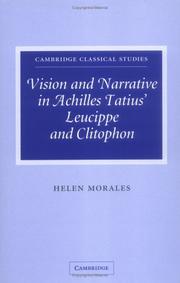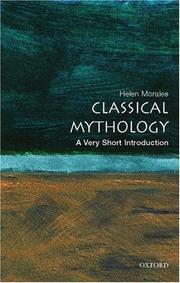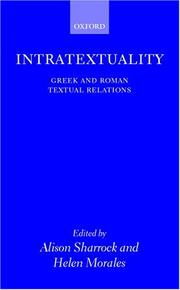| Listing 1 - 10 of 12 | << page >> |
Sort by
|

ISBN: 0521642647 9780521642644 Year: 2004 Publisher: Cambridge: Cambridge university press,
Abstract | Keywords | Export | Availability | Bookmark
 Loading...
Loading...Choose an application
- Reference Manager
- EndNote
- RefWorks (Direct export to RefWorks)
Love stories, Greek --- Digression (Rhetoric) --- Visual perception in literature. --- Loss (Psychology) in literature. --- Vision in literature. --- Narration (Rhetoric) --- Rhetoric, Ancient. --- Histoires d'amour grecques --- Digression (Rhétorique) --- Perception visuelle dans la littérature --- Perte (Psychologie) dans la littérature --- Vision dans la littérature --- Narration --- Rhétorique ancienne --- History and criticism. --- Histoire et critique --- Achilles Tatius. --- Digression (Rhetoric) in literature --- Visual perception in literature --- Loss (Psychology) in literature --- Vision in literature --- Rhetoric, Ancient --- History and criticism --- Digression (Rhetoric) in literature. --- Eye in literature. --- History --- Romance fiction, Greek --- Digression (Rhétorique) --- Perception visuelle dans la littérature --- Perte (Psychologie) dans la littérature --- Vision dans la littérature --- Rhétorique ancienne --- Eye in literature --- Ancient rhetoric --- Classical languages --- Greek language --- Greek rhetoric --- Latin language --- Latin rhetoric --- Greek romance fiction --- Greek fiction --- Rhetoric --- Discourse analysis, Narrative --- Narratees (Rhetoric) --- Love stories, Greek - History and criticism

ISBN: 0191517003 1281146811 1435609425 9786611146818 9780191517006 9781281146816 6611146814 9781435609426 0192804766 9780192804761 019177605X 9780191579332 0191579335 Year: 2007 Publisher: Oxford New York Oxford University Press
Abstract | Keywords | Export | Availability | Bookmark
 Loading...
Loading...Choose an application
- Reference Manager
- EndNote
- RefWorks (Direct export to RefWorks)
From Zeus to Europa, to Pan and Prometheus, the myths of ancient Greece and Rome continue to pervade the numerous facets of our existence. The author explores the rich history and varying interpretations of classical myth in both high art and popular culture as well as its ongoing influence in modern society.
Book
ISBN: 9781568589350 Year: 2020 Publisher: New York (N.Y.) : Bold Type Books,
Abstract | Keywords | Export | Availability | Bookmark
 Loading...
Loading...Choose an application
- Reference Manager
- EndNote
- RefWorks (Direct export to RefWorks)
"The picture of classical antiquity most of us learned in school is framed in certain ways -- glossing over misogyny while omitting the seeds of feminist resistance. Many of today's harmful practices, like school dress codes, exploitation of the environment, and rape culture, have their roots in the ancient world. But in Antigone Rising, classicist Helen Morales reminds us that the myths have subversive power because they are told -- and read -- in different ways. Through these stories, whether it's Antigone's courageous stand against tyranny or the indestructible Caeneus, who inspires trans and gender queer people today, Morales uncovers hidden truths about solidarity, empowerment, and catharsis. Antigone Rising offers a fresh understanding of the stories we take for granted, showing how we can reclaim them to challenge the status quo, spark resistance, and rail against unjust regimes."--Amazon.com.
Feminist theory. --- Mythology, Greek. --- Mythology, Roman.
Book
ISBN: 9781472273642 Year: 2021 Publisher: London Wildfire
Abstract | Keywords | Export | Availability | Bookmark
 Loading...
Loading...Choose an application
- Reference Manager
- EndNote
- RefWorks (Direct export to RefWorks)
Sociology of culture --- Mythology --- Images of women --- Book --- Empowerment --- Antiquity
Book
ISBN: 1472273605 9781472273604 1472273613 9781472273611 Year: 2020 Publisher: London Wildfire
Abstract | Keywords | Export | Availability | Bookmark
 Loading...
Loading...Choose an application
- Reference Manager
- EndNote
- RefWorks (Direct export to RefWorks)
The picture of classical antiquity most of us learned in school is framed in certain ways, glossing over misogyny while omitting the seeds of feminist resistance. Many of today's harmful practices, like school dress codes, exploitation of the environment, and rape culture, have their roots in the ancient world. But in Antigone Rising, classicist Helen Morales reminds us that the myths have subversive power because they are told and read in different ways. Through these stories, whether it's Antigone's courageous stand against tyranny or the indestructible Caeneus, who inspires trans and gender queer people today, Morales uncovers hidden truths about solidarity, empowerment, and catharsis. Antigone Rising offers a fresh understanding of the stories we take for granted, showing how we can reclaim them to challenge the status quo, spark resistance, and rail against unjust regimes.
Mythology, Classical --- Women --- Mythology
Book
Year: 2004 Publisher: Cambridge Cambridge University Press
Abstract | Keywords | Export | Availability | Bookmark
 Loading...
Loading...Choose an application
- Reference Manager
- EndNote
- RefWorks (Direct export to RefWorks)

ISBN: 0199240930 Year: 2000 Publisher: Oxford : Oxford university press,
Abstract | Keywords | Export | Availability | Bookmark
 Loading...
Loading...Choose an application
- Reference Manager
- EndNote
- RefWorks (Direct export to RefWorks)
Greek literature --- Latin literature --- Intertextuality. --- Littérature grecque --- Littérature latine --- Intertextualité --- History and criticism. --- Histoire et critique --- -Latin literature --- -Literature, Comparative --- -Transmission of texts --- -Classical literature --- -Greek literature --- -Intertextuality --- Criticism --- Semiotics --- Influence (Literary, artistic, etc.) --- Balkan literature --- Byzantine literature --- Classical literature --- Classical philology --- Greek philology --- Literature, Classical --- Literature --- Literature, Ancient --- Literary transmission --- Manuscript transmission --- Textual transmission --- Criticism, Textual --- Editions --- Manuscripts --- Comparative literature --- Literature, Comparative --- Philology --- Roman literature --- Latin philology --- Greek influences --- Greek and Latin --- Latin and Greek --- Appreciation --- -Criticism, Textual --- History and criticism --- Transmission of texts --- Criticism, Textual. --- Greek and Latin. --- Latin and Greek. --- Greek influences. --- Littérature grecque --- Littérature latine --- Intertextualité --- Intertextuality
Book
ISBN: 1108993842 1009008390 1009007629 1316518582 Year: 2021 Publisher: Cambridge ; New York, NY : Cambridge University Press,
Abstract | Keywords | Export | Availability | Bookmark
 Loading...
Loading...Choose an application
- Reference Manager
- EndNote
- RefWorks (Direct export to RefWorks)
The embrace of reception theory has been one of the hallmarks of classical studies over the last 30 years. This volume builds on the critical insights thereby gained to consider reception within Greek antiquity itself. Reception, like 'intertextuality', places the emphasis on the creative agency of the later 'receiver' rather than the unilateral influence of the 'transmitter'. It additionally shines the spotlight on transitions into new cultural contexts, on materiality, on intermediality and on the body. Essays range chronologically from the archaic to the Byzantine periods and address literature (prose and verse; Greek, Roman and Greco-Jewish), philosophy, papyri, inscriptions and dance. Whereas the conventional image of ancient Greek classicism is one of quiet reverence, this book, by contrast, demonstrates how rumbustious, heterogeneous and combative it could be.
Classical literature --- Reader-response criticism. --- Greek literature --- Greek influence. --- History and criticism. --- Reader-oriented criticism --- Reception aesthetics --- Criticism --- Reading --- Literature, Classical --- Literature --- Literature, Ancient --- Latin literature
Book
ISBN: 9781316518588 9781108995320 9781108993845 1009007629 1009008390 1108993842 Year: 2021 Publisher: Cambridge ; New York, NY Cambridge University Press
Abstract | Keywords | Export | Availability | Bookmark
 Loading...
Loading...Choose an application
- Reference Manager
- EndNote
- RefWorks (Direct export to RefWorks)
The embrace of reception theory has been one of the hallmarks of classical studies over the last 30 years. This volume builds on the critical insights thereby gained to consider reception within Greek antiquity itself. Reception, like 'intertextuality', places the emphasis on the creative agency of the later 'receiver' rather than the unilateral influence of the 'transmitter'. It additionally shines the spotlight on transitions into new cultural contexts, on materiality, on intermediality and on the body. Essays range chronologically from the archaic to the Byzantine periods and address literature (prose and verse; Greek, Roman and Greco-Jewish), philosophy, papyri, inscriptions and dance. Whereas the conventional image of ancient Greek classicism is one of quiet reverence, this book, by contrast, demonstrates how rumbustious, heterogeneous and combative it could be.
Classical literature --- Greek literature --- Reader-response criticism. --- Greek influences. --- History and criticism. --- Appreciation. --- Greek literature. --- Greek influence. --- Reader-response criticism --- Reader-oriented criticism --- Reception aesthetics --- Criticism --- Reading --- Literature, Classical --- Literature --- Literature, Ancient --- Latin literature --- Greek influence --- History and criticism
Book
ISBN: 9780140449259 0140449256 Year: 2011 Publisher: London : Penguin,
Abstract | Keywords | Export | Availability | Bookmark
 Loading...
Loading...Choose an application
- Reference Manager
- EndNote
- RefWorks (Direct export to RefWorks)
| Listing 1 - 10 of 12 | << page >> |
Sort by
|

 Search
Search Feedback
Feedback About UniCat
About UniCat  Help
Help News
News